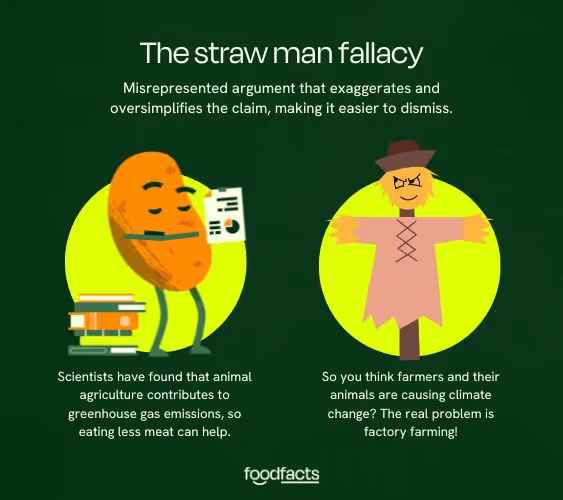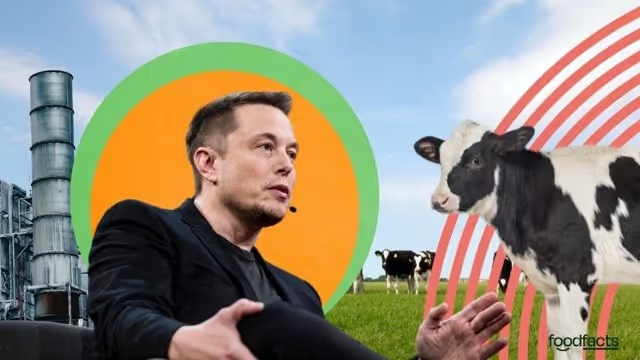
Elon Musk claims animal agriculture makes no difference to global warming





Coral Red: Mostly False
Orange: Misleading
Yellow: Mostly True
Green: True
Learn more about our fact-checking policies
During a recent interview on The Joe Rogan Experience, Elon Musk made claims about animal agriculture and its impact on climate change. He argued that animal agriculture has "no material effect on climate change," and Rogan suggested that the idea of animal farming as a major environmental contributor is simply “propaganda.”
Animal farming is a well-established contributor to greenhouse gas emissions, deforestation, and resource use.
Understanding the full environmental impact of meat production is not easy, because it involves a myriad of factors which can have a knock-down effect on ecosystems, greenhouse gas emissions, water usage, deforestation, and biodiversity loss. Claims on social media often simplify this complexity by portraying direct causal relationships, such as “cows don’t cause climate change.” But if we overlook the role of animal agriculture, we risk missing an opportunity to address a major climate challenge.

For accurate information on sustainability issues, rely on evidence-based sources that consider the full environmental impact, including emissions, resource use, and biodiversity.
Claim 1: Animal agriculture has no material effect on climate change.
Animal agriculture has a measurable and significant impact on global greenhouse gas emissions and climate change. The Intergovernmental Panel on Climate Change (IPCC) has highlighted animal agriculture’s role in climate change. Agriculture as a whole is responsible for about 26% of global GHG emissions, with more than half of these emissions coming from animal-based food production. These emissions stem from various processes, including land use changes, feed production, and water consumption—each contributing to significant environmental impacts.
One major contributor to these emissions is methane from livestock digestion and manure management. Methane is a potent greenhouse gas, and although it lingers in the atmosphere for a shorter period than carbon dioxide, it has more than 80 times the warming potential of CO₂ over a 20-year period.
Furthermore, the environmental impact of animal agriculture extends beyond emissions. Deforestation for grazing land and soy production for animal feed has led to widespread habitat loss, particularly in regions like the Amazon rainforest, where over 800 million trees were cut down within six years to meet the demand for Brazilian beef. These environmental changes reduce the planet’s carbon-sequestering capabilities, exacerbating climate change impacts.
Using a Straw Man Fallacy to Stir Engagement
Musk and Rogan’s discussion creates a straw man fallacy by suggesting that environmental advocates claim animal agriculture is the “main driver” of climate change, an argument which is then criticised for being exaggerated and false. In reality, scientists recognise fossil fuels as the largest contributor, and no credible source claims that animal agriculture is the primary cause of global warming. However, environmental scientists emphasise that reducing animal agriculture’s share of emissions is an essential step for achieving climate goals. By misrepresenting the argument, the podcast hosts downplay the actual impact of meat production, making a serious environmental issue seem exaggerated or irrelevant when it’s actually a key area for action. Instead, the argument that animal agriculture has no ‘material effect’ on climate change implies that dietary changes will achieve nothing to limit global warming and its consequences.

Claim 2: There’s no way to measure the impact animals have on global warming.
This is a popular claim on social media, which tends to depict environmentalists as detached from the reality of what goes on in farms. But contrary to Musk's claim, scientists have been measuring the impact of animal agriculture on global warming for decades. Researchers use several methods to assess the environmental footprint of animal farming, including life cycle assessments (LCAs) that measure emissions from every stage of production, from land and water use to the release of methane and nitrous oxide during livestock digestion and waste decomposition. The impact of animal agriculture is assessed using factors such as:
- Greenhouse gas emissions (methane, CO₂, nitrous oxide)
- Land and water use
- Biodiversity impact
- Eutrophication (pollution of water bodies due to excessive nutrients)
Trying to measure the climate impact of a diet is difficult, because scenarios don’t always reflect what people actually eat or differences in how food is produced. However, researchers from the University of Oxford used data from 38,000 farms in 119 countries, and analysed the diets of 55,504 people in the UK to measure this. They found that greenhouse gas emissions, land use, and water use were all higher for diets containing more animal products. They concluded that despite variations in production methods and food origin, the high environmental impact of animal agriculture is clear.
Claim 3: Regenerative animal farming is carbon-neutral.
Joe Rogan adds that factory farming is the real issue, stating that regenerative farming is carbon-neutral. While regenerative practices, like managed grazing, can enhance soil health and carbon sequestration, the overall effect is limited. A review of 300 papers found that only a fraction of the emissions produced by animals – through burping and defecating – can be offset through carbon sequestration. Additionally, regenerative farming requires significantly more land—up to 2.5 times more than conventional beef production. This makes it unrealistic to switch globally to regenerative practices and keep consuming and producing current levels of animal products. In terms of land use, regenerative farming might actually be more harmful to the environment.
Why Reducing Meat Consumption Matters
The environmental impact of the meat we consume is real. While global statistics and emissions' measurements may seem removed from daily life, they translate directly to the food on our plates. The recommendation to reduce meat consumption isn’t just theoretical; it’s grounded in the fact that producing meat requires vast resources. Each piece of meat involves land, water, feed, and significant emissions that drive environmental degradation. Favouring local or sustainably raised meat can reduce some impacts, but meaningful benefits can only be achieved if paired with an overall reduction in meat consumption.
On the other hand, if everyone adopted high-meat diets like the Carnivore Diet—frequently discussed by Joe Rogan—the demand for livestock would skyrocket, requiring even more animals, land, and resources. This would multiply the emissions and lead to greater deforestation, especially if regenerative or grass-fed practices are prioritised, as they require more land to produce the same amount of meat.
We have contacted Joe Rogan and are awaiting a response.
Stand Against Nutrition Misinformation
Misinformation is a growing threat to our health and planet. At foodfacts.org, we're dedicated to exposing the truth behind misleading food narratives. But we can't do it without your support.
Resources
If you’d like to know more about where environmental statistics come from, Our World in Data is a website containing some really helpful information and answering these questions very clearly.
References
Hannah Ritchie, et al., (2022). "Environmental Impacts of Food Production." https://ourworldindata.org/environmental-impacts-of-food
Hannah Ritchie (2022). FAQs on the environmental impacts of food. https://ourworldindata.org/faqs-environmental-impacts-food.
Andrew Wasley et al., (2023) More than 800m Amazon trees felled in six years to meet beef demand. https://www.theguardian.com/environment/2023/jun/02/more-than-800m-amazon-trees-felled-in-six-years-to-meet-beef-demand
Peter Scarborough, et al. (2023). “Vegans, vegetarians, fish-eaters and meat-eaters in the UK show discrepant environmental impacts.” https://www.nature.com/articles/s43016-023-00795-w
Tara Garnett et al., (2017). Grazed and confused? Ruminating on cattle, grazing systems, methane, nitrous oxide, the soil carbon sequestration question – and what it all means for greenhouse gas emissions. https://edepot.wur.nl/427016
Jason E. Rowntree et al., (2020). Ecosystem Impacts and Productive Capacity of a Multi-Species Pastured Livestock System. https://doi.org/10.3389/fsufs.2020.544984



foodfacts.org is an independent non-profit fact-checking platform dedicated to exposing misinformation in the food industry. We provide transparent, science-based insights on nutrition, health, and environmental impacts, empowering consumers to make informed choices for a healthier society and planet.

Was this article helpful?
















.svg)
